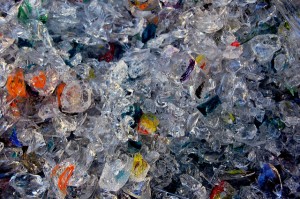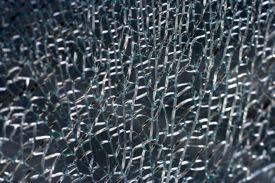Spontaneous glass breakage confounds
If you ask industry experts, one of the most confounding things about glass is the phenomenon of spontaneous breakage. As the name suggests, glass shatters without any apparent cause. Doors, windows and other large sheets of glass seemingly burst. So what causes spontaneous glass breakage? Can it be predicted? More importantly, can it be prevented?
Many different causes of spontaneous glass breakage have been identified, and many of them are not as mysterious as they initially appear. Seemingly minor damage along the edge of a glass panel may cause glass to break without warning. Glass can also be damaged at the time of installation. The damage may not be readily apparent, but this kind of damage can come back to haunt an unaware property owner!
Sometimes the seeds of destruction are sown much earlier – at the moment the glass is created. Inclusions in the raw materials can cause the glass to develop weak spots. Under the right atmospheric conditions, or during normal operation, the inclusions can cause the glass to shatter.
One such inclusion is nickel sulfide. If nickel sulfide, which can be found in the raw materials used to produce glass, is present in the glass mixture, it can pool in the center of the pane when the glass forms and cools. These nickel sulfide “stones” are often imperceptible, and can wreak havoc long after the glass has cooled. Once the glass is installed, temperature fluctuations can change the size of the nickel sulfide deposit, and can flex the glass, which leads to sudden, spontaneous glass breakage. It’s important to note that nickel sulfide causes spontaneous breakage only in tempered glass. Untempered (annealed or heat strengthened) glass does not experience this phenomenon, although it also can break spontaneously for other reasons.
Most glass manufacturers try to eliminate nickel sulfide from their raw materials. In doing so, they reduce the likelihood that tempered versions of their glass will be manufactured with this fatal flaw. In addition, manufacturers sometimes stress the glass panels with heat in an attempt to identify (and destroy) suspect panels before they can be shipped to the end user.
Most often, the cause of spontaneous glass breakage can be traced to production-level flaws, glazing or installation damage, or significant temperature variations that affect the glass once it has been installed in its permanent location.
Because there are so many different causes of spontaneous glass failure, it’s unlikely that they can all be eliminated. Inclusions are often microscopic, and aren’t visible with the naked eye. Testing the finished panels can often help identify flaws, to ensure they aren’t installed. Other approaches, including heat strengthening and laminating, can help control the result of breakage and limit the possibility of injuries.
Fortunately spontaneous glass breakage is rare. Thanks to safety treatments for glass, the risk of injury is also reduced when spontaneous breakage occurs.
Glassprimer™ glass paint is a specialized glass coating that bonds permanently to glass surfaces. GlassPrimer also makes a glass surface molecular activator that is designed to work with UV-inkjet glass printing processes. For more information about Glassprimer™ glass paint, please visit the rest of our site. If you’d like to purchase Glassprimer™ glass paint, please visit our online store.
Photo Credit: , via FreeImages.com


